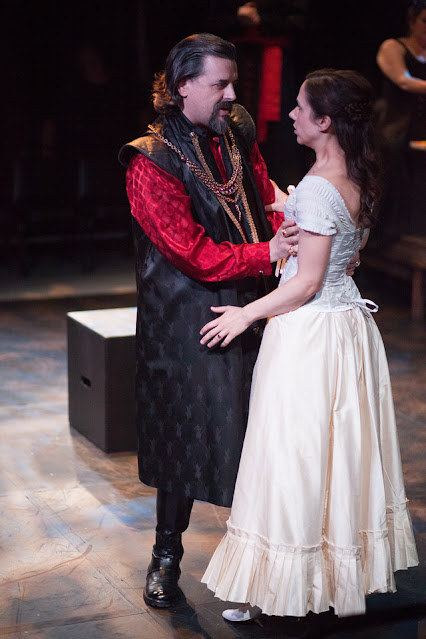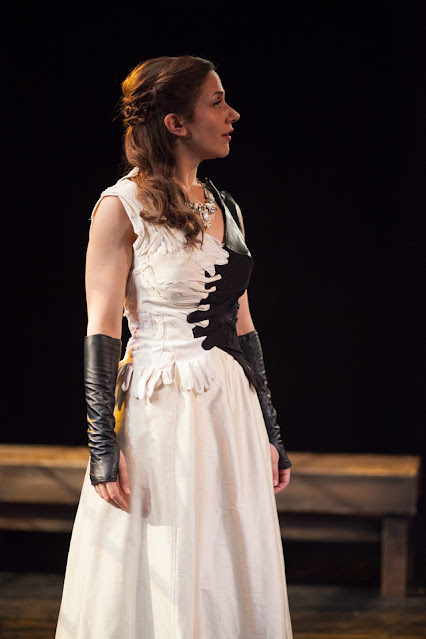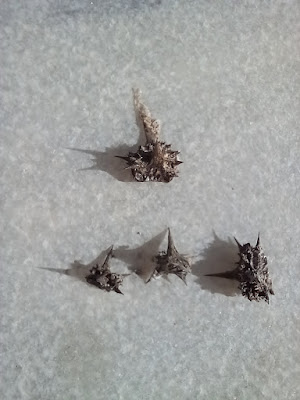Thomas Middleton, Women Beware Women (1613-14 or 1619-23?)
 |
| Julie Cray Leong's costumes for Bianca |
[Image source: http://juliecraycostumes.com/women-beware-women . All images from the site of costume designer Julie Cray Leong, for a Shakespeare Theater Company / Academy for Classical Acting production of Women Beware Women (c. 2016: I couldn't find any details of the actors). Initially Bianca wore a simple white dress. Later she wore a richer dress that graphically showed the Duke's hands all over her.]
I'd better emphasize that I'm embarrassingly ignorant of Thomas Middleton's writing. Lots of it is extant: see for instance the many plays on Chris Cleary's very useful site: https://tech.org/~cleary/middhome.html . One of the few that isn't available there, unfortunately, is Women Beware Women. (There is a plain online text here: https://www.poetryexplorer.net/poem.php?id=10107691 .) Given the ignorance, I of course have no hope of saying anything here that hasn't already been said.
The fact is, I come to Middleton with a bucketload of prejudices. I'm passionate about Shakespeare, but if I can't read Shakespeare I'd rather read plays by early contemporaries: Marlowe and Kyd, for instance. Those who had the poor taste to insist on continuing to write plays when Shakespeare had already scaled the heavens don't get much of a look in with me. At least until we are safely into another era altogether (i.e the Restoration).
But, well, it's hardly Middleton's fault that he was sixteen years younger than Shakespeare. And actually it's fascinating how divergent Women Beware Women is from Shakespeare's conception of tragedy. It arrives at a serious engagement with human questions but it goes about it in ways that seem quite alienating to a Shakespeare fan, a refusal of expected naturalism, a withholding of confidences about the characters we're watching.
*
Welcome with all th' affection of a mother,
That comfort can express from natural love!
Since thy birth-joy—a mother's chiefest gladness,
After sh'as undergone her curse of sorrows—
Thou wast not more dear to me than this hour
Presents thee to my heart: welcome again!
LEANTIO [Aside]. 'Las, poor affectionate soul, how her joys speak to me!
I have observ'd it often, and I know it is
The fortune commonly of knavish children
To have the lovings't mothers.
MOTHER. What's this gentlewoman?
LEANTIO. O, you have named the most unvaluedst purchase
That youth of man had ever knowledge of!
As often as I look upon that treasure,
And know it to be mine . . .
[Act I, Scene 1, lines 1-31]
So it starts, rather slowly. A Romeo and Juliet come back to reality after a romantic elopement, but romance is left behind, and this Romeo, crucially, is not from a house "alike in dignity".
Leantio is apparently a man whom women are fond of, and his mother's greeting is effusive. It's odd that his first words are an aside. Middleton has no qualms about freezing the action for an aside, at any moment. (Isabella even has an aside in the middle of performing the masque (V.2.102-105), with the eyes of the on-stage audience upon her.)
This particular aside registers Leantio's guilty consciousness that he's about to disappoint his mother when she learns of his equivocal behaviour. Is he really knavish? Middleton's drama doesn't really interest itself in individual character or inherent moral status but in how people behave in given circumstances of class and economy. In these circumstances both Leantio and his mother understand Bianca as a prize beyond the expectations of their modest place in society. Leantio tries to emphasize to his mother that it's a vast stroke of good fortune. (Leantio is a "factor", a merchant's agent -- which, we infer, is why he went to Venice.) His mother isn't taken in by Leantio's braggadoccio. She says (what he probably knows already, but won't admit) that Bianca is a prize he should not have collected, it will be beyond him to hold on to her -- and so indeed it proves. [Perhaps she remembers what happened to the factor Lorenzo in Decameron IV.5, source of Keats' Isabella.]
Leantio's insecurity is apparent: he doesn't want his mother going on about what wives might reasonably expect, in case it awakens "spirits" in Bianca, or persuades her to act by "the licentious swindge of her own will".
Despite the insecurity, he allows himself to imagine that theirs will be a perfect bourgeois household full of children, the envy of the barren rich. But Leantio's often rather browbeaten way of talking about life doesn't suggest he's really cut out for happiness.
Bianca is eloquently silent during this long colloquy. When she does finally speak, it's to say just such compliant things as Leantio would wish. It looks too good to be true, and hints that Bianca, not Leantio, controls the course of events here. Not in herself, but in the fact of her superior condition, that can't just be wished away. There's an economic instability in the situation.
[John Mc Elroy and Ann Christensen write very well about this opening scene -- links below.]
Love or lust is an economic fact that has to be accommodated in one way or another, but lies beyond explanation. What did Bianca see in Leantio? And later, what does Livia see in Leantio? Why does Hippolito, who could pick and choose, desire his own niece? No answer is offered. The play is interested in what these desires lead to, but not in why they settled on one person or another. And especially how they lead to the inexorable logic of money transactions. "All preferment / That springs from sin and lust, it shoots up quickly", Leantio comments (III.2.47); and a few lines later, Livia says smugly "I have enough to buy me my desires" (III.2.63).
The play that begins in this modest lodging will end in a festivity at the highest end of Florence society. That movement is a large part of what the play's about. The festivity is of course strewn with corpses. There's an element of cautionary tale in this particular tragedy. And yet after all it's a lot of fun. A comitragedy, an ensemble piece (rather well plotted and structured: consider how all the main characters receive about the same amount of focus): it ought to be easy, I fancy, for a company to turn Women Beware Women into an absorbing evening's entertainment.
*
Here's a schematic of who kills who in Women Beware Women:
DUKE
Sets up the death of Leantio (IV.1).
Killed by Bianca (accidentally) (V.2).
BIANCA
Promotes the death of Leantio: because she surely anticipates this outcome when she recounts his "dangerous" behaviour to the Duke in IV.1. This isn't 100% certain, but the natural inference to be drawn from her emphatic "I love peace, sir" is that she senses what the Duke's going to do and wants to underscore her approval of by all means necessary.
Attempts to kill the Cardinal but fails. Accidentally kills the Duke instead (V.2).
Kills herself (V.2).
LEANTIO
Threatens Bianca (and the Duke, in absentia) with a vengeance that sounds like it might take the form of violence (IV.1).
Killed by Hippolito (IV.2)
HIPPOLITO
Kills Leantio (IV.2). Applauds Isabella's killing of Livia (V.2).
Killed by Guardiano (V.2) who has applied poison to the Cupids' arrows, though Hippolito actually finishes the job himself by running onto the guard's weapon.
ISABELLA
Kills Livia (V.2) with poisoned smoke.
Killed by Livia (V.2) with flaming gold.
LIVIA
Kills Isabella (V.2) with flaming gold.
Killed by Isabella (V.2) with poisoned smoke.
GUARDIANO
Conspires with Livia to kill Hippolito and Isabella (IV.2), and instructs Ward in some of the details (V.1).
Posthumously kills Hippolito with his plan B (the poisoned arrows). (V.2)
Killed by falling into his own trap (intended for Hippolito) (V.2)
WARD
Co-opted by Guardiano to assist in killing Hippolito (V.1), though as usual it's unclear how fully Ward grasps what's going on.
Runs away (V.2) and survives.
CARDINAL
Could his mention of "vengeance" at the end of IV.3 indicate a personal impulse to resort to violence against the Duke/Bianca (which is what Bianca seeks to pre-empt). But given his genuine sorrow at their demise (V.2) this seems unlikely.
Survives assassination attempt by Bianca (V.2)
*
These events come thick and fast at the end. I wanted to check my impression that virtually everyone who gets killed is also a killer, at least in intention.
The exception, probably, is Leantio (from whose death all else follows). His wild words do express vengeful hatred towards Bianca and the Duke, but they don't suggest that he has formulated any definite plan. Despite his innocence in that regard, his death doesn't arouse much sympathy in us.
*
And yet Women Beware Women isn't just black comedy. There are times when a different kind of tension holds us, a horrified interest in Livia telling lies to her niece to persuade her into incest, for instance. Above all, the chess scene (II.2) where Bianca is prised away by Livia and Guardiano and subjected to the Duke's implacably calm powerplay (rape ? seduction ? no single word really covers it; King David's claim of Bethsabe in Peele's David and Bethsabe is a pretty close parallel).
But we have to maintain a quite difficult stance, of pity for the victims (both as themselves, and as representative of all others snared in this way) balanced by observations that significantly reduce our good will toward them. An Isabella who is apparently not bothered that her lover thinks he's committing incest. A Bianca who embraces her role as the Duke's mistress with increasing enthusiasm and ruthlessness.
 |
| Bianca and Leantio |
[Image source: http://juliecraycostumes.com/women-beware-women .]
I found these useful (in chronological order):
Charles A.Hallett, “The Psychological Drama of Women Beware Women”, Studies in English Literature, 1500-1900, vol. 12, no. 2, [Rice University, Johns Hopkins University Press], 1972, pp. 375–89, https://doi.org/10.2307/449900. Illuminatingly argues for the importance of the concept of cynicism in the play. That is, an accommodation to circumstances, a feeling that no moral values are worth upholding. Interprets Livia's behaviour as arising from ingrained cynicism, and sees Bianca as tragically plummeting into cynicism when the Duke's authority overwhelms her.
John F. Mc Elroy, “The White Devil, Women Beware Women, and the Limitations of Rationalist Criticism.” Studies in English Literature, 1500-1900, vol. 19, no. 2, [Rice University, Johns Hopkins University Press], 1979, pp. 295–312, https://doi.org/10.2307/450210. Percipient about Leantio's character and on the balance in the play between the simple judgments of a comic mode and a more serious way of seeing the action. But suggests that our coolness of response to Middleton's characters (e.g. their deaths don't affect us with horror or pity) is a limitation of the author's approach.
 |
| Bianca and the Duke |
[Image source: http://juliecraycostumes.com/women-beware-women .]
I suppose if I say that Middleton is no poet then I betray a very limited idea of poetry, but I think you'll know what I mean. His verse looks like it was written fast and with minimal interest in being "poetic", though it's often pithy, observant and forceful. It's an excellent vehicle for a continuous subtle movement of ideas and assertions (both true and deceptive); it allows the drama to flow vividly. But it doesn't throw up many anthologizable flowers. You can go on for pages without ever being recalled to the fact that you're reading iambic pentameters (which anyway he's often pretty casual about, metrically speaking).
Still, I'll have a go at an anthology, one quote from each character.
FABRITIO
ISABELLA
MOTHER
*
From what I've seen, commentators tend to regard Ward with particular revulsion. I have a rather different impression. I see him as an adolescent who isn't formed into an adult, as someone who is impossibly shy of communicating to any purpose with the adults, but only with his sidekick Sordido. (Naturally he isn't shy with his guardian either, merely drives him mad by constantly fooling around.) He still lives in a world of play, and -- given what the rest of the play shows us -- is refreshingly free of a consciousness of himself as an economic entity. Certainly his self-centredness and obscenity does expose the brute reality that lies beneath the machinations of the other characters, but, in Ward's own case, words are not matched by deeds; he's an ineffective imitator of the adepts (just as when he imitates Hippolito's dancing). His inspection of Isabella is grotesque, but it's Isabella who means to exploit Ward, not vice versa. For all the vain boasting his own sexual experience is minimal (III.3.21-22) and I don't imagine he'd do anything about being pre-emptively "cuckolded" except to sulk and play cat-and-trap. Guardiano is evidently of the same opinion.
GUARDIANO: Speak, hast thou any sense of thy abuse? Dost thou know what wrong's done thee?WARD: I were an ass else -- I cannot wash my face, but I am feeling on't.GUARDIANO: Here, take this galtrop, then; convey it secretly into the place I showed you; look you, sir, this is the trap-door to't. (V.1.1-6)
 |
| A caltrop or "galtrop" (V.1.5) |
[Image source: Wikipedia .]
A simple but effective defensive weapon. I haven't managed to source an image of a seventeenth-century one (the one above is apparently Roman, though I find that hard to believe), but the basic tetrahedral design has remained the same for two thousand years.
You scattered caltrops on the ground as, especially, a defence against mounted troops. It doesn't seem very plausible to me that Hippolito -- or, as it turns out, Guardiano himself -- would actually die from tumbling onto a caltrop. Perhaps we're meant to think that Guardiano poisoned the tips of the caltrop, just as he did with the Cupids' arrows.
 |
| Bianca's new dress |
[Image source: http://juliecraycostumes.com/women-beware-women .]
I've been reading Women Beware Women and other plays, edited by Richard Dutton in the Oxford English Drama series (1999).
I paid a pound for it, which I thought was good value to discover Middleton through four of his best plays, and I still think so. But Middleton calls for many explanatory notes, about a dozen per page. I have no problem with the content of these notes, but their format makes extricating the content a hideous business. I've read them all, and I still wonder if it's someone's idea of a joke.
 |
| Julie Cray Leong's costumes for Livia and Isabella |
[Image source: http://juliecraycostumes.com/women-beware-women .]
Labels: Thomas Middleton




0 Comments:
Post a Comment
<< Home